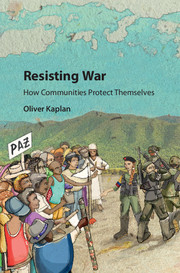Book contents
- Frontmatter
- Dedication
- Contents
- List of Figures
- List of Tables
- Preface and Acknowledgments
- List of Abbreviations
- 1 Introduction: Civilian Autonomy in Civil War
- 2 A Theory of Civilian Decision-Making in Civil War
- 3 The History of Conflict and Local Autonomy in Colombia
- 4 Living to Tell About It: Research in Conflict Settings
- 5 How Civilian Organizations Affect Civil War Violence
- 6 Why Some Communities Are More Organized than Others
- 7 The Institution of the ATCC: Protection through Conciliation
- 8 Discovering Civilian Autonomy in Cundinamarca
- 9 Civilian Autonomy around the World
- 10 Conclusions and Policy Implications
- Appendix A Archives Consulted
- Appendix B Supplementary Documentation on the ATCC
- Glossary
- References
- Index
9 - Civilian Autonomy around the World
Published online by Cambridge University Press: 13 June 2017
- Frontmatter
- Dedication
- Contents
- List of Figures
- List of Tables
- Preface and Acknowledgments
- List of Abbreviations
- 1 Introduction: Civilian Autonomy in Civil War
- 2 A Theory of Civilian Decision-Making in Civil War
- 3 The History of Conflict and Local Autonomy in Colombia
- 4 Living to Tell About It: Research in Conflict Settings
- 5 How Civilian Organizations Affect Civil War Violence
- 6 Why Some Communities Are More Organized than Others
- 7 The Institution of the ATCC: Protection through Conciliation
- 8 Discovering Civilian Autonomy in Cundinamarca
- 9 Civilian Autonomy around the World
- 10 Conclusions and Policy Implications
- Appendix A Archives Consulted
- Appendix B Supplementary Documentation on the ATCC
- Glossary
- References
- Index
Summary
“The people are very unified so the Taliban failed. We are dead set against the army, too.”
– Elder, Buner, Pakistan, 2008 (Parlez and Shah 2008b)“Early on in this war, I met with the main religious leaders in the community: the bishop and the mother superior of the main convent. We decided that even if the mountains around us were exploding with fighting, we would not go to war…. We decided adamantly that Maloula would not be destroyed…. The situation here will not deteriorate; it's the opposite. People support each other.”
– Sunni imam, Maloula, Syria, 2012 (Di Giovanni 2012)Civilian efforts for autonomy reach far beyond Colombia. In this chapter, I explore four additional out-of-sample cases of civilian autonomy from around the globe. Although these additional cases from Colombia, the Philippines, Afghanistan, and Syria were not systematically selected for comparison, they exhibit geographical diversity, involve conflicts of diverse types and origins, and have ample documentation of civilian strategies and armed actor responses. They highlight unique aspects of civilian autonomy, including showcasing the diversity and prevalence of strategies and how they function in sectarian conflicts, Muslim-majority countries, and with the presence of international forces. They are also “tough” cases for autonomy given the intensities of the conflicts. Their displays of civilian autonomy contrast strikingly with conventional interpretations that emphasize the victimization of civilians in these conflicts.
The inclusion of these additional cases and countries shows that the main argument of this book is not culturally bounded. In fact, it shows that local civilian organization frequently supersedes cultural differences as an explanation for violence. Put differently, cohesion and organization explain differences in outcomes of violence within particular cultural groups. The cases also further showcase the diversity of innovation by civilians in war as well as the limits of their efforts when circumstances turn dire.
I first assess the civilian autonomy theory I developed in Colombia based on additional firsthand field research in Colombia on “tough,” out-of-sample community cases in the highly contested demilitarized zone of the Macarena region. I then also explore the protective autonomy strategies that communities have pursued in both Muslim and Christian areas of the Philippines. Using interviews with community advocates and archival research, I conduct a quantitative analysis of the strategies implemented by communities that declared themselves “Zones of Peace.”
- Type
- Chapter
- Information
- Resisting WarHow Communities Protect Themselves, pp. 270 - 299Publisher: Cambridge University PressPrint publication year: 2017



